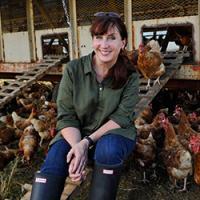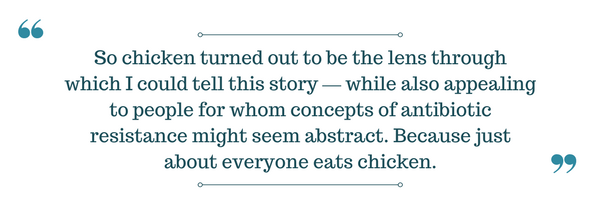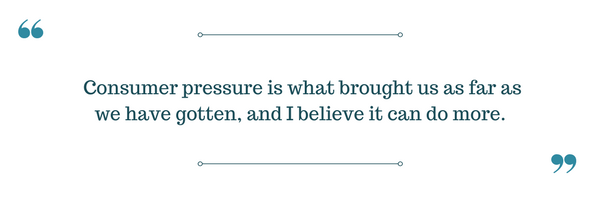Expert Spotlight: Five Questions with Maryn McKenna
Maryn McKenna is an award-winning journalist and the author of two critically acclaimed books, Superbug and Beating Back the Devil. On September 12, 2017, she launches her third book, Big Chicken. This book tells the story of how antibiotics helped fuel modern agriculture and changed the way the world eats. Ms. McKenna is a contributor to National Geographic and writes for The New York Times Magazine, Newsweek, The Atlantic, Wired, Scientific American, Slate, Modern Farmer and others. Her 2015 TED talk, "What Do We Do When Antibiotics Don't Work Anymore?" has been viewed more than 1.5 million times.
1. We heard you were nicknamed “Scary Disease Girl” while working as a journalist at the Atlanta Journal Constitution. How did you earn this moniker and what made you want to cover science and “scary” diseases?
I was the AJC reporter assigned to the Centers for Disease Control and Prevention, the federal disease agency that is based in Atlanta. This meant that what I was writing about whatever they were responding to — and usually that was epidemics and disasters, or outbreaks of things that were dangerous or unusual enough to catch their attention. (It also involved a lot of talking my way into outbreak-response deployments, mostly in the middle of the night.) At some point my colleagues noticed that everything I wrote about either gave them nightmares or made them lose their appetites for lunch, and thus a nickname was born.
2. Your new book, Big Chicken, debuts September 12. Why did you choose to write a book about chicken?
A few years ago — while researching my last book, SUPERBUG, which is a sort of biography of MRSA — I ran across the statistic that four times as many antibiotics are sold for animal use in the United States as for human use. This astounded me, mostly because it made no sense. Medicine is always telling physicians and the public to use antibiotics conservatively; how could those cautions exist in the same time and space as an industry that gave antibiotics without prescription to animals that were not sick? So I decided to find out. It didn’t take long to discover that chickens were the first animals to receive “growth promoter” antibiotics experimentally, and also that the intensive poultry production those drugs created became a model for the rest of the industry — the basis of everything we think of as factory farming. To close the loop, it also turns out that, at least in the United States, chicken may be the first sector of the protein economy to relinquish routine antibiotic use. So chicken turned out to be the lens through which I could tell this story — while also appealing to people for whom concepts of antibiotic resistance might seem abstract. Because just about everyone eats chicken.
3. You’ve covered antibiotic overuse in food animals for many years and we believe your dogged reporting is why so many other journalists are covering the issue today. Given your extensive knowledge on antibiotic use in food animal production, what practical next steps do you think need to happen in the near term to solve the antibiotic resistance crisis?
Thank you! It was a lonely beat for a long time, and I remember people telling me that this was too-niche an issue to focus on. It’s good to see other reporters recognize the importance of this topic. The thing we ought to hope for is more government action, so that we can move from restriction of growth promoters to restriction of preventive antibiotic use, so that antibiotics end up being used only to cure animals that are infected. But at this moment of political chaos, I suspect that’s not reasonable to hope for. So what I hope for, instead, is yet more pressure by consumers of all types and sizes — parents, restaurants, schools, health care systems — to persuade companies to go further in relinquishing antibiotics. Consumer pressure is what brought us as far as we have gotten, and I believe it can do more.
4. You visited a lot of chicken farms while researching your book. What impressed you most? What did you find most alarming? Do you have any anecdotes to share with our readers?
I happened to be doing my reporting at the time that Perdue Farms was turning away from antibiotic use, and via social networks and personal referrals, I happened to meet a lot of Perdue poultry producers. I was impressed by their willingness to adapt to change. This company they had been contracted to, for years, was suddenly changing the rules of engagement, yet most of the farmers I met were not resisting; they were curious to see what happened next.
That said: It became very clear to me how granular the industry is. A farmer could be well intentioned and yet be undermined by decisions he could not affect — a field representative who disliked him, a production complex that sent sickly birds. Those could ruin a farmer in one county while one in the next state, reporting to a different complex in the same company, did much better. I gained a lot of sympathy for how powerless farmers in big agriculture can be.
5. This last question might be like asking a mom with a newborn if she is going to have another baby, but here goes: do you have a third book in you, and if so, what might it focus on?
Oh, Lord. I hope so? As challenging as they are, books really are the best way to get deep into a topic or policy question. I suspect whatever I do next will have something to do with health or food, and climate change, because it is really the grand challenge of our times.




